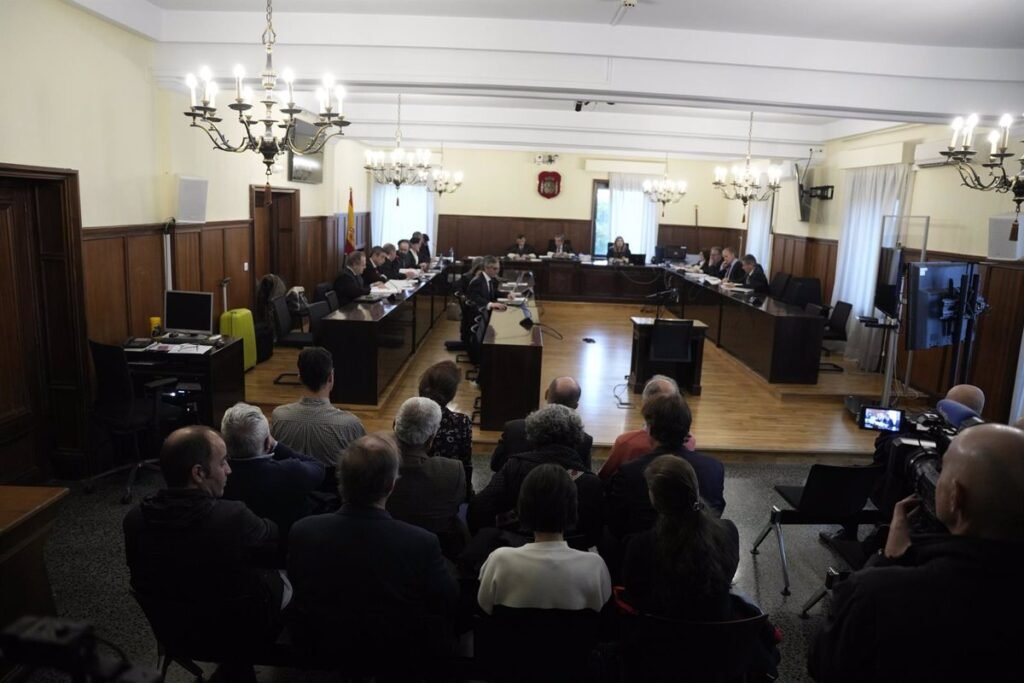
The Third Section of the Court of Seville continues this Monday the trial for alleged crimes of prevarication, influence peddling, embezzlement, and fraud in the award of the exploitation of the Los Frailes mine in Aznalcóllar to the business group Mexico-Minorbis; with the appearance of the brothers Mario and Isidro López Magdaleno, responsible for the Magtel group, owner of Minorbis. Specifically, they are ranked fourth and fifth among a group of five defendants.
Among those already declared as defendants are, among others, Aurora G.M., Alberto F.B., and Luis C.G., all officials of the Junta de Andalucía and members of the technical committee of the tender called by the Andalusian Administration to award the exploitation rights of the mining complex, marked by the major natural disaster that occurred in 1998 due to the fracture of its metal waste dam when the site was operated by Boliden-Andaluza de Piritas S.A. (Apirsa).
Alberto F.B., by the way, was a worker in the mining site in the months leading up to the aforementioned natural disaster, as he explained himself in response to his defense’s questions, as these accused individuals have not responded to the allegations.
All of them, as did defendants José Marcos A.P., auditor of the Junta delegated to the Ministry of Innovation, Science, and Enterprise at the time of the events and member of the tender board; and Pastora S.d.l.C.S.d.I, a member of the tender board; denied that they were under pressure or received prior instructions or directives aimed at influencing the outcome of the evaluation process of the offers, which were those of Minorbis with the support of Grupo México and Emerita, which, after not winning the tender, filed a criminal complaint alleging that their proposal was economically superior.
WITHOUT ADDING NEW EVALUATION CRITERIA
In addition, these accused individuals denied that the technical committee introduced their own or innovative evaluation criteria in the process, stating that the tender was governed «exclusively» by the criteria previously «established» and made public through their corresponding orders and resolutions, and that the technical committee sought «the greatest objectivity» possible when evaluating the offers, within which they stated that Emerita’s proposal «was less detailed» than that of Minorbis, at least «conceptually.»
«The criteria were published,» these accused individuals defended, detailing that when the technical committee noticed that in «some third-level subcategories» of the tender, the «explicit weighting to be applied» was not included, it was decided to «replicate» the parameters of «other sections» as a more «objective» solution.
In the initial sessions of the trial, focused on preliminary matters, the defenses of the 16 accused requested the annulment of the procedure for «violation of fundamental rights of freedom, defense, and privacy» and an alleged «exceeding of competences» by the Seventh Section of the Court when resolving the appeals filed in the instruction phase, through a tribunal led by Judge Mercedes Alaya, the initial instructor of the macro-case of the fraudulent employment regulation files (ERE) and arbitrary aids to companies funded by the funds of the Junta de Andalucía.
It is worth noting that at the request of the Prosecutor’s Office, the investigating judge of the initial complaint by Emerita-Forbes Manhattan, Judge Patricia Fernández Franco, twice ordered the dismissal of the investigation for not finding a crime, but after the appeals filed by the private accusations against these decisions to archive, the Seventh Section of the Court of Seville, which includes Judge Mercedes Alaya, sided with the accusations ordering the reopening of the proceedings.
THE «COMPETENCE EXCESS» OF THE COURT
According to the defense lawyers, in this case there is an «excess of competence» by the Seventh Section of the Court; «since in the first dismissal order of the Investigating Court No. 3 in 2015, it was stated that the procedure was correct and that it was not proven that the actions were aimed at benefiting Minorbis» in the evaluation of the offers; while regarding the second dismissal order of the court, also overturned by the Seventh Section; it indicated that there were «no definite indications of the crimes reported, beyond generic references of mere irregularities.»
However, the Third Section of the Court rejects in its latest order that the Seventh Section exceeded its functions, warning that «the defenses deny the possibility of the appellate court to overturn the decision of the investigating judge to dismiss the case and make an assessment of guilt, decide on the performance of new evidence, and expand the scope of trial both in terms of facts and those being investigated.»
In this regard, the Third Section of the Court explains that «the possibility of the appellate court modifying the decision of the lower court regarding the conclusion of the investigation and ordering new evidence has been widely accepted by lower court jurisprudence, since there is not only no provision preventing it, but on the contrary, it is obligatory to rule on the claims made by the parties in this regard.»
Furthermore, the Third Section of the Court cites «various judgments of the TC and TS that refer to resolutions of provincial courts regarding the modification of the assessment made by the instructor, including in relation to the resolution adopted after the conclusion of the investigation or for the admission and performance of new evidence, where the validity of such resolutions is not questioned, nor is their annulment ordered, but only the possible violation or not of the right of the plaintiff to an impartial judge»; therefore rejecting said preliminary issue.
The court, in that sense, dismisses most of the preliminary issues raised by the parties, but decides to exclude the prosecution for the crime of embezzlement and postpones the issues relating to the applicable legislation for the alleged crime of misappropriation until the moment the sentence is issued.
The criminal case stems from the appeal of the resolution of the international tender promoted by the Junta de Andalucía to award the exploitation rights of the Aznalcóllar mine, closed after the well-known environmental disaster of 1998, when it was operated by the company Boliden-Apirsa (Andaluza de Piritas S.A.).
TO THE COURTS
The business group Mexico Minorbis, in which the Andalusian company Magtel participated, and Emerita-Forbes Manhattan participated in the aforementioned tender, with the exploitation rights being awarded to the Mexico Minorbis group by the decision of the tender board.
After the tender was resolved, Emerita-Forbes Manhattan filed a complaint with the courts accusing the regional administration of alleged crimes of prevarication, bribery, influence peddling, and fraud, alleging, among other things, that their economic offer far exceeded that of Minorbis, the final awardee of the exploitation rights.
Among the defendants in the trial are the brothers Mario and Isidro López Magdaleno, president and vice president of the Cordoba-based company Magtel; the former president of the State Industrial Participations Company (SEPI) Vicente Cecilio Fernández Guerrero for his role as the former general secretary of the Ministry of Innovation, Science, and Employment; the former director general of Mines of the Junta de Andalucía María José Asensio Coto, and various officials of the Junta.





